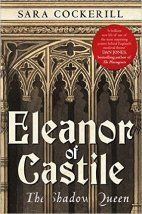Eleanor of Castile: The Shadow Queen - Sara Cockerill

Eleanor of Castile: The Shadow Queen - Sara Cockerill

Non-Fiction
Pages: 432
Eleanor of Castile is certainly deserving of the title 'shadow queen', being probably one of the least known of all England's medieval queens. If people have heard of her at all, it is likely either through the surviving 'Eleanor crosses', erected by her grieving husband Edward I to mark the passage of her funeral bier, or through the saccharine apocryphal story of her sucking poison from Edward's wounds after an assassination attempt in the Holy Land whilst on Crusade. So it's refreshing to read a biography that attempts to flesh out her story and bring her out of the shadows.
That said, I'm not sure Sara Cockerill doesn't oversell her subject here somewhat. I'm all for giving credit where it's due and highlighting accomplishments and achievements, and Cockerill has certainly done her research and then some - but there were many points in this book where I felt she was giving too much credit to Eleanor. Medieval gender roles didn't often give women, even queens, much of a voice, and however much Edward was devoted to his wife, I very much doubt he paid much heed to her opinions on town construction, military strategy, treaty-making, or international diplomacy, as Cockerill claims. Simply because Edward and Eleanor had an exceptionally close marriage doesn't automatically give her an equal role in his actions and accomplishments. And by the same token, just because Eleanor and Edward were often together and seemed to avoid separation wherever possible, doesn't mean the historian can take Eleanor's presence for granted, in places where the historical record gives us no evidence.
The author also very much seems to have an agenda in terms of leavening history's view of Eleanor as acquisitive and grasping when it came to her property dealings. It does leave a reader wondering how one individual can provoke such contradictory views in historians relying on apparently the same scanty sources - this book is very sympathetic to Eleanor's character, whereas Lisa Hilton's recent book on medieval queens takes almost the opposite approach. The book is also very sympathetic to Edward too, a figure far less deserving, and makes very little mention of his harshness in dealing with his enemies, whether English, Welsh or Scottish. You wouldn't known he was the king known to history as the Hammer of the Scots from this portrayal.
From the criticism you would think I didn't enjoy this book - I did. But as with any biography of a subject so far removed in history, with so little trace in the historical record, there is just far too much supposition, conjecture and interpretation here for my comfort.